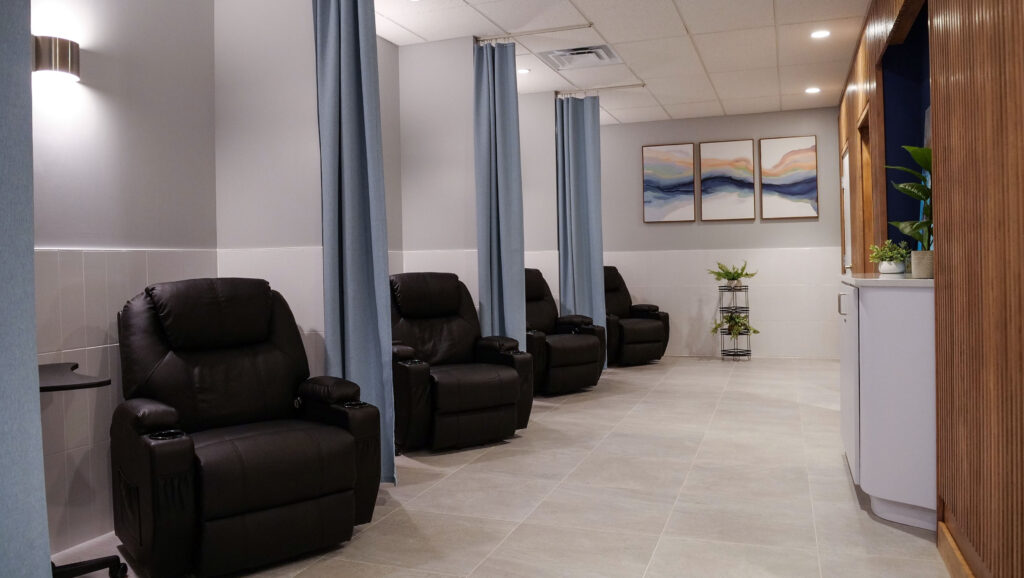Posted by: Philadelphia Eye Associates in Eye Health, News on December 5, 2024

Philadelphia Eye Associates is proud to be the first and only practice in the region to provide cataract surgery in an office-based surgical suite. Over the past 5 years, hundreds of eye surgeons around the country have chosen to perform cataract surgery in these suites and it is projected that in the future most cataract surgeries will be done in an office-based surgical suite.
So, what is an office-based surgical suite?
An office-based surgical suite is a fully accredited specialty specific operating room that is located within a medical practice rather than offsite at a separate location.
Multiple studies have demonstrated the safety and efficacy of cataract surgery in office-based surgical suites—results that match or even surpass the outcomes at hospitals or surgery centers. 1-3 It makes sense that the outcomes in an office-based setting may be better than in other centers. Why? Because in office-based suites patients are given mild oral sedation (typically with valium) and then given time to allow the medication to take effect before heading into surgery. If, after waiting, more medication is needed, more is given until the patient reaches their ideal level of sedation.
This is in contrast to other settings, where patients are given fast-acting and higher strength intravenous (IV) medications, such as fentanyl, just moments before the surgery begins. This can lead to oversedation, or a patient who is unable to follow their surgeon’s directions. Oversedation can be dangerous because patients become less cooperative or may even unexpectedly fall asleep and then wake up, moving at the wrong time and jeopardizing their surgery. The stronger medications used through the IV line can also lead to nausea, headaches, and other medication-related side effects.
While the actual operating rooms of office-based surgical suites are nearly identical to those of hospitals and surgery centers (same equipment, same sterilization protocols, same procedures), the pre-operative areas look, sound, and feel nothing alike.
In a hospital or ambulatory surgery center you’ll find a very busy and active pre-operative area, full of staff starting intravenous lines, anesthesiologists discussing sedation risks, and hungry patients in hospital gowns on stretchers waiting anxiously as their eyes dilate, with no sedation until they finally get into the operating room.
But step into our office-based surgical suite and you’ll instead find just a couple of patients quietly waiting comfortably in a beautiful spa-like pre-surgical area, reclined in heated massage chairs, their eyes closed, and their stomachs full (there’s no need to fast with oral sedation!). They’ll have received a sedative by mouth upon arrival and will be relaxing as the sedative and the dilating drops begin to take effect.
Since we use oral sedation rather than intravenous sedation, there are no needles to place in your arm ahead of surgery. For years, patients have complained that the only painful part of cataract surgery is the IV needle. No longer!
Most patients in our office-based surgical suite elect to receive dropless cataract surgery, meaning that they do not have to use any eye medications before or after surgery, other than over-the-counter tear drops for any dryness they may experience. Traditionally, patients were required to use 2-3 medications several times a day for about a month after surgery or risk swelling, pain, or infection. Advances in medication delivery have eliminated the need for those drops in most of our patients. This also saves patients money!
We know that most people have better ways to spend their day than waiting at a hospital or surgery center for several hours (which is common for cataract surgery in those settings). With office-based surgery we are able to streamline the surgical experience, such that most patients spend less than 90 minutes with us from check-in to check-out on their surgical day.
The cataract surgery itself, on average, takes less than 15 minutes and is painless. When the surgery is done, there is no time wasted waiting for any IV medications to wear off. Instead, the patient’s accompanying family member or support person joins them immediately to receive instructions on how to care for their eye and then they walk out together.
Having the surgical suite in our office also provides us with greater control over scheduling, meaning we can typically schedule patients for surgery within a few weeks of their initial consultation. It also allows us the flexibility to offer more convenient surgical times that meet the needs of our patients and their families.
Patients who have had surgery in both settings consistently tell us how much they prefer the office-based surgical suite over the hospital or ambulatory surgery center experience. This is the future of cataract surgery—and the future is here now at Philadelphia Eye Associates.
Dr. Brad H. Feldman is a board-certified, fellowship-trained ophthalmologist specializing in cornea transplantation, cataract surgery, and laser vision correction such as LASIK and PRK. Learn more about Dr. Feldman.
__________________________________________
1 Ianchulev T, Litoff D, Ellinger D, Stiverson K, Packer M. Office-Based Cataract Surgery: Population Health Outcomes Study of More than 21 000 Cases in the United States. Ophthalmology. 2016 Apr;123(4):723-8. doi: 10.1016/j.ophtha.2015.12.020. Epub 2016 Jan 22. PMID: 26804760.
2 Kugler LJ, Kapeles M, Durrie. Safety of office-based lens surgery: a U.S. multicenter study. J Cataract Refract Surg. 2023. 10.1097/j. jcrs.0000000000001231.
3 iRWD Registry: Real-World Data Collection for Ophthalmic Office-Based Surgery.
8025 Roosevelt Blvd.
Philadelphia, PA 19152